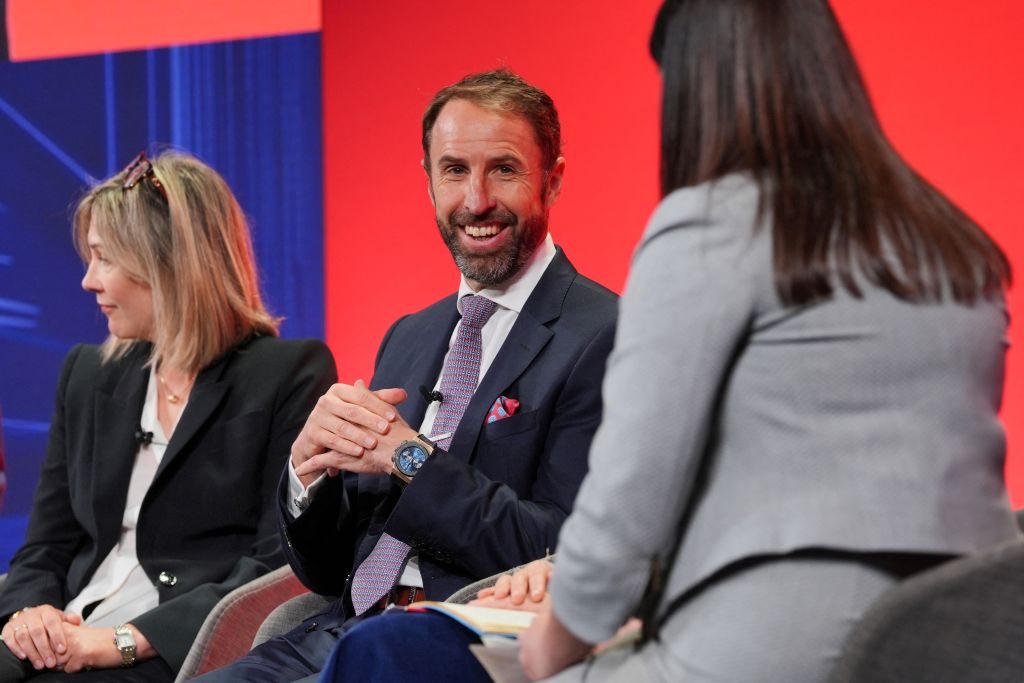Football’s most revered promulgator of platitudes is at it again. Sir Gareth Southgate, the former England manager, has warned that vulnerable young men are falling victim to ‘callous, manipulative and toxic influencers’. Delivering the Richard Dimbleby Lecture, Southgate said the young are falling prey to an ideology that asserts success is measured by money and dominance.
This is just a tad rich coming from a man who owes his wealth and fame to a game that worships money above all else, and in which everyone – football club owners, managers and players – prizes dominance at any cost over their rivals. In a nutshell, a man who used to manage some of the wealthiest young footballers in the world is complaining that men are too obsessed with wealth and status. We have certainly reached peak Southgate as the nation’s go-to guru.
The former England manager believes young men are ‘suffering’, feeling ‘isolated’, and spending more time online ‘searching for direction’. Well, yes, but tell us something new. Instead, all that is on offer is a warm bath of received wisdoms – such as Southgate’s warning that good role models are in short supply due to a lack of father figures at home, and that ‘this void is filled by a new kind of role model who does not have their best interest at heart’. No prizes for guessing that Southgate is likely alluding to the rise in popularity of people like Andrew Tate, the online influencer who faces charges, which he denies, of human trafficking and sexual misconduct in Romania.
Southgate says that toxic influencers willingly trick young men into believing that success is measured by money or dominance, never showing emotion, and that the world – including women – is against them. It’s hard not to gawp at the brass neck on display here. Footballers, past and present, are hardly role models when it comes to attitudes towards women.
Does Southgate’s Dimbleby address offer any solutions to the problems identified? No, not really. According to Southgate, a world must be created where young men can ‘find comfort in their own identity and a sense of belonging to those around them’. Youngsters should live in a culture that judges them not just by how well they succeeded but ‘by how much they grow, by the effort they put in and the character they develop’. Good luck with that. The question is: how is this world to come into being, Sir Gareth? The sermon doesn’t end there.
‘We have to show young men that character is more important than status,’ Southgate insisted. ‘That how you treat others is more important than how much money you make.’ This, coming from someone who earned £5 million a year as England manager. Funny how those with plenty of money are always rather keen to lecture others on how little money really matters.
Don’t get me wrong. Southgate is a manifestly decent and well-meaning chap. He did his best managing England, even if he failed to win a major tournament. But that’s about the sum of it. He really has nothing original to offer, beyond warm sentiments, when it comes to thinking or insights on the social ills of Britain’s young men.
This prompts a broader question: why exactly has Southgate been given the honour of delivering the Dimbleby Lecture anyway? This is meant to be a public forum for distinguished and influential figures from the world of politics, business, science and the arts to offer illumination and insight into the complex challenges facing society. Previous speakers have included Sir Tim Berners-Lee (inventor of the world wide web), Dame Sarah Gilbert (who helped develop the AstraZeneca Covid vaccine), the philanthropist Bill Gates and former US president Bill Clinton.
Southgate is really not in the same league. Even those well-disposed towards him would find it hard to make the case that he is an original thinker when it comes to social ills. He is a failed former England football manager, no more, no less, with a nice line in wanting the best for everyone. He has now joined the long list of public figures to issue dire warnings about how the nation’s young are falling to pieces, victims of this or that – without actually offering up any real answers.








Comments